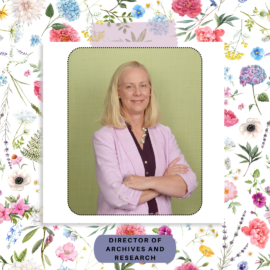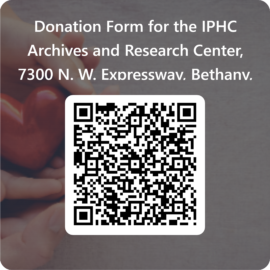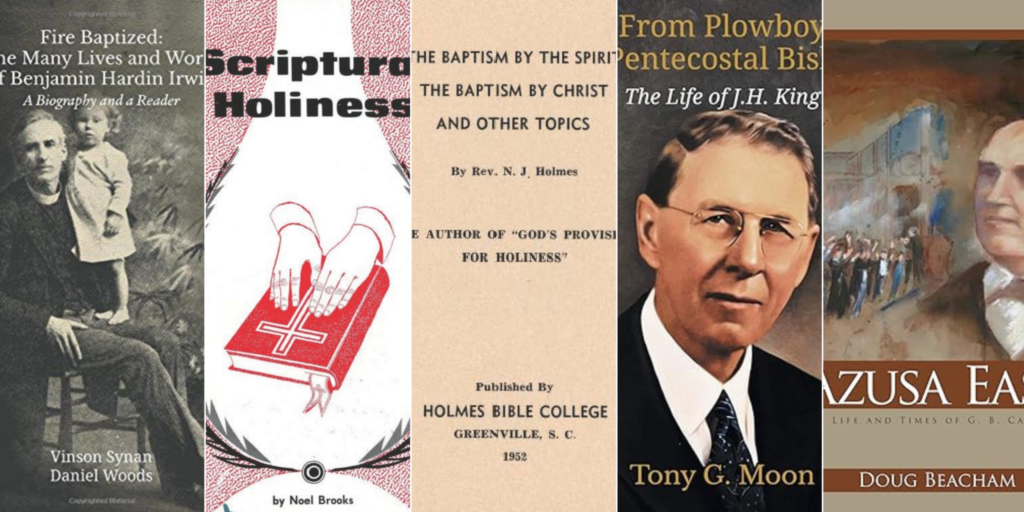
Welcome to the IPHC Archives and Research Center
"Light is sown for the righteous." (Psalm 98:11, NIV)
"Light" can mean God's wisdom, guidance, knowledge, favor, direction. "Sown" means someone went ahead of you and planted.
 It's humble work. It's hard work. It is work that does not get a spotlight or receive applause. On this website, you will find some of the history of the International Pentecostal Holiness Church. These people of vision cared for you and your future. They were the ones in the pulpit and they were the ones in the pews. They were the ones who set foot on foreign lands and the ones who faithfully tithed to carry out God's work. Inspired by God, empowered by faith, emboldened by prayer, and ignited by the Holy Spirit, they laid the very path you walk upon as are a part of the IPHC family of faith.
It's humble work. It's hard work. It is work that does not get a spotlight or receive applause. On this website, you will find some of the history of the International Pentecostal Holiness Church. These people of vision cared for you and your future. They were the ones in the pulpit and they were the ones in the pews. They were the ones who set foot on foreign lands and the ones who faithfully tithed to carry out God's work. Inspired by God, empowered by faith, emboldened by prayer, and ignited by the Holy Spirit, they laid the very path you walk upon as are a part of the IPHC family of faith.
When we look ahead, our eyes should be on Christ and our feet should be energized by our history.
When we ignore our history, we limit our harvest and dim the light. Our past invites us into our future. The Word says: "You have given me the heritage of those who fear Your name " in Psalm 61:5. Our family is more than those related to us or the friends we have been blessed with; our family is our local church, our conference, our denomination, our international affiliates. Our heritage is evidence of God's hand on our lives. When we lay aside our history, we lay aside the testimonies of His people.
But why would we do that?
We are a people who have influenced the world. Acts 1:8 says "But you will receive power when the Holy Spirit comes on you; and you will be my witnesses in Jerusalem, and in all Judea and Samaria, and to the ends of the earth.” Indeed, our heritage stretches all the way back to the Upper Room. The evidence of God's work lies within our books, our sermons, our programs, our conferences, and the testimonies of our people, and we have carefully gathered many of these things in our vaults and are endeavoring to share them with all of you online.
I invite you to treasure the archives we protect and to appreciate the vision G. F. Taylor had in 1921 when he understood we had to preserve our history even as it was unfolding in its early years.
God has blessed and provided for the IPHC. We must treasure what has been left to us as a witness of the leading of the Good Shepherd, we must study our roots, and we must let our heritage continue to inform how we bring God's light to the lost. We must continue to collect archival treasures for the future, and we must try to remember that everyone in the IPHC is important here. Whether you are new or whether your family goes back a couple of generations, you are valued. You belong.
Who we are today is just a moment in the middle of a very long future. I invite you to explore this website and to be encouraged by what God has done through His people.
I also invite you to share your histories with us. Leave the evidence of you or your family's testimony for those who come after you. Your lives, your sacrifices, your calling inspires others!
Malachi 3:16, Psalm 16:6, Joshua 4:1-6
Join us for the Archives Breakfast
Friday, July 17, 2026 from 7:00-8:30 a.m.
Special speaker: Rev. Zach Tomlinson
2026 General Conference
Register online, beginning in January 2026: Open now!
___________________________________________________________________________________________________________
Follow us on Facebook
Rev. Cherie McDade, the Archives Administrative Assistant, is the one who posts 99% of our social media. Every week, she goes into the vaults and prays to find something to encourage and to interest you. Please consider joining us online! We have over 1,200 followers.
_________________________________________________________________________________________________________
Visit our Online Library Database
Videos * Recorded Sermons * Sermon Outlines * Full Text Books and Documents * Photos * Historical Items * And More!
Looking for sermons to read or to hear? Videos? Books to read? Photos? We have well over 2,000 items in our online library, and we are adding to this every week. If you need a book, check here first and see if we have it linked as a pdf. If you are new to using this resource, please watch this short video to learn how. We have over 3,000 items here, and we have linked to Flickr photo albums with several thousands of pictures as well.
Link to our online inventory as of January 2026
_________________________________________________________________________________________________________
The Pentecostal Consortium
The Advocate * IPHC Manuals * IPHC Minutes * The IPHC Experience * The Fire-Baptized *
Other Pentecostal Denominations
Looking for a copy of an Advocate? For church minutes? Manuals? For the IPHC Experience? Search thousands of pages relevant to our history, and that of the Fire Baptized, on the Pentecostal Consortium. Here's a short video showing you how to find what you need on this important resource.
The Society of Pentecostal Studies Library and Archives Committee created this Webinar on the Pentecostal Consortium
__________________________________________________________________________________________________________
Can't find it?
If you don't see the book you need linked to our online library, you should see if you can get it by interlibrary loan. First, search World Cat for books and other items. Need help? Please watch this short video explaining how to get a printed copy of a book you need for study or research using this database. If the book is not available by interlibrary loan, please email Dr. Welch with what you need.
________________________________________________________________________________________________________
 Dr. Kristen Welch, Director of Archives and Research
Dr. Kristen Welch, Director of Archives and Research
Education:
Doctorate in Rhetoric, Composition, and the Teaching of English (University of Arizona, 2007)
Graduate Certificate in Archival Studies (Louisiana State University, May 2025)
Vice-President of the South Carolina Archivists Association
Member of the Society of American Archivists
Member of the Archivists of Religious Collections, the Archival Educators, and the Accessioning, Acquisitions, and Appraisal Sections through the Society of American Archivists
Member of the Oklahoma Archivist Association
Co-Interest Group Leader for the Society of Pentecostal Studies Theological Education Group
Books, articles, presentations, workshops, and a description of her family's history in the IPHC are linked here.
Rev. Cherie McDade, Administrative Assistant, Archives and Research Center
Please contact us at:
kwelch@iphc.org or archives@iphc.org
Call: 405-787-7110 ext. 7157
 Donations: We welcome your donations, even if they are only digital copies. We have a high-speed scanner on site in OKC if you want to bring an item in to be scanned for inclusion in our digital collection. Please fill out this donation form and reach out before making an appointment with us to drop off physical items. We seek to add to IPHC history, and we value each and every person who wishes to contribute.
Donations: We welcome your donations, even if they are only digital copies. We have a high-speed scanner on site in OKC if you want to bring an item in to be scanned for inclusion in our digital collection. Please fill out this donation form and reach out before making an appointment with us to drop off physical items. We seek to add to IPHC history, and we value each and every person who wishes to contribute.
___________________________________________________________________________________________________________
How to Start a Church Archives
Please contribute to the Anthology of IPHC Women Preachers
IPHC Archives and Research Center Awards
Give Financial Resources to Archives
What's Happening Right Now in the Archives
Our Collections
Visiting the IPHC Archives
Global Ministry Center: Instructions for E-Archives
Using Our Materials for Publication
Timelines
History of the IPHC
How our Theology has Been Shaped Over the Years
The IPHC on the Oklahoma History Center Website
Significant Locations in IPHC History
Educational Institutions
Holmes Bible College
Chaplains and the Military
Orphanages and Hospitals
Conferences and Locations
A Prophetic Word, 1991
Affiliations and Memberships
General Conferences
General Superintendents or Bishops of the IPHC
Minutes
The Advocate
Manuals
Advocate Press/LifeSprings
Global Ministry Center: 50th Anniversary 2025
IPHC Scholars
IPHC Authors
Regional IPHC Archives
The IPHC in Oklahoma History
Research Guide
Strategic Plan for the IPHC Archives
Quilt Project
The 2021 IPHC Archives Centennial
News from the Archives



